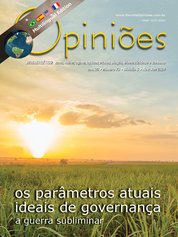Arnaldo Jardim
Deputado federal, presidente da Comissão Especial de Transição Energética e Produção de Hidrogênio
OpAA78
Combustíveis do futuro: mais presentes e necessários do que nunca
Há anos ouvimos, cada vez mais, sobre as mudanças climáticas e a urgência com que as nações devem adotar medidas efetivas para mitigar os efeitos nocivos das mudanças climáticas, que impactam o meio ambiente, a economia, a saúde das pessoas e a sociedade de maneira geral. Um dos caminhos é a descarbonização dos transportes por meio da substituição gradual dos combustíveis fósseis.
Fui designado relator do Projeto de Lei 4516/2023, que cria o Programa Combustível do Futuro, reafirmando o compromisso do Brasil com a redução das emissões dos GEEs – Gases de Efeito Estufa. O objetivo da proposta é acelerar nossa transição para uma mobilidade de baixo carbono.
Dentre as ações do programa, estão o aumento da mistura de etanol na gasolina, de 27,5% para 30%; o incentivo à produção e utilização de Combustível Sustentável de Aviação (SAF, do inglês, Sustainable Aviation Fuel) e de Diesel Verde; e a regulamentação dos Combustíveis Sintéticos.
Na verdade, a palavra transição não se aplica bem ao Brasil. Diferente do resto do mundo, cuja matriz energética é predominantemente fóssil, o Brasil tem investido, desde a década de 1970, no aumento da participação das fontes renováveis em sua matriz.
Um esforço que nos levou a invejáveis 48,4% de energia limpa frente a, apenas, 15% da média mundial.
No setor de transportes, por exemplo, quase 50% da gasolina comercializada no País é substituída pelo etanol, o qual reduz as emissões de CO2 em até 90% quando comparado ao combustível fóssil. Com o programa do biodiesel, deixamos de consumir 47 bilhões de litros do diesel, evitando a emissão de 82 milhões de toneladas de CO2. Portanto, em vez de transição energética, o termo correto para o Brasil seria “consolidação da renovabilidade da nossa matriz”.
Entretanto, esse processo impõe, no mínimo, dois grandes desafios. Um de caráter tecnológico, haja vista que a adição de SAF ao querosene de aviação, de Diesel Verde ao diesel fóssil e o aumento da mistura de etanol à gasolina demandarão aprimoramentos dos motores de combustão interna e, consequentemente, investimento em inovação tecnológica. Por isso, a importância de o programa ser discutido com os fabricantes de equipamentos automotores, especialmente a Anfavea.
Outro desafio é de caráter econômico, pois a adição de biocombustíveis não pode impactar o preço do combustível comercializado no país. No caso do etanol, por exemplo, o programa traz a autorização para o aumento da mistura, mas a fixação desse percentual é competência do Conselho Nacional de Política Energética (CNPE), que o faz de maneira gradual e transparente, sempre compatibilizando produção e demanda. Além disso, a oferta de etanol pode ser ampliada a partir do milho, que já responde por 20% da produção nacional do biocombustível.
O Programa Combustível do Futuro incrementará, ainda mais, a utilização de combustíveis de baixo carbono no Brasil. As empresas aéreas ficarão obrigadas a reduzirem, de forma gradual, as emissões de CO2, misturando o SAF ao querosene de aviação. Essa obrigatoriedade nos alinha ao compromisso do setor aéreo internacional de tornar-se neutro em carbono até 2050. Sozinha, a aviação comercial é responsável por 3% das emissões globais de GEEs.
No transporte de cargas pesadas – caminhões, ônibus e máquinas agrícolas - o Diesel Verde se somará ao biodiesel, já produzido no Brasil desde 2006, para reduzir, ainda mais, as emissões do setor, considerado de difícil eletrificação. Além de descarbonizar, a adoção do Diesel Verde contribuirá para a redução da dependência externa de diesel fóssil.
Outra iniciativa que ajudará o País a consolidar sua vocação para a produção de energia renovável é o Marco Legal do Hidrogênio de Baixo Carbono, que está sendo elaborado pela Comissão Especial de Transição Energética e Produção de Hidrogênio Verde, da qual sou presidente.
Destaco, por exemplo, a virtuosidade das fontes renováveis, eólica e solar, na produção do hidrogênio por meio da eletrólise, especialmente no Nordeste brasileiro. O Brasil tem vantagens competitivas e comparativas para disputar o mercado internacional. Mas não podemos nos esquecer do potencial de produção de H2 a partir da biomassa, principalmente com a utilização dos resíduos da indústria sucroenergética, cujo custo de produção tem se mostrado mais competitivo quando comparado a outras rotas tecnológicas.
Certamente, podemos produzir hidrogênio para exportar – a União Europeia será um grande consumidor - mas o H2 precisa ser utilizado na descarbonização dos nossos processos produtivos, a chamada neoindustrialização. Um processo que demandará esforço do setor produtivo e muito mais investimentos.
Por isso, apresentei o Projeto de Lei 5174/2023, que institui o Programa de Aceleração da Transição Energética – PATEN. Elaborado a partir da contribuição de diversos economistas e estudiosos do setor de infraestrutura, o programa poderá ser um alavancador de investimentos em um segmento fundamental para o desenvolvimento nacional.
O Brasil pode ser vanguarda da nova economia, da economia verde e da economia de baixo carbono. Por meio dos créditos tributários e da transação financeira, esse projeto poderá antecipar investimentos em uma escala muito mais rápida, com forte impacto sobre a atividade econômica.




